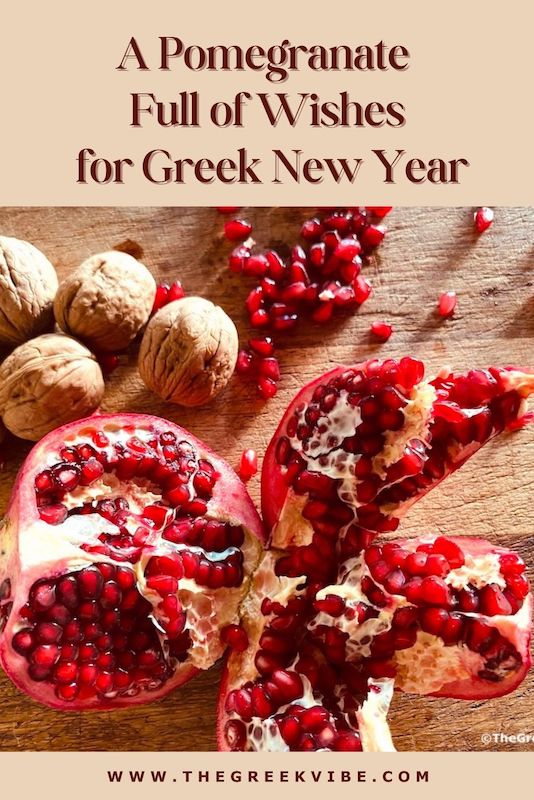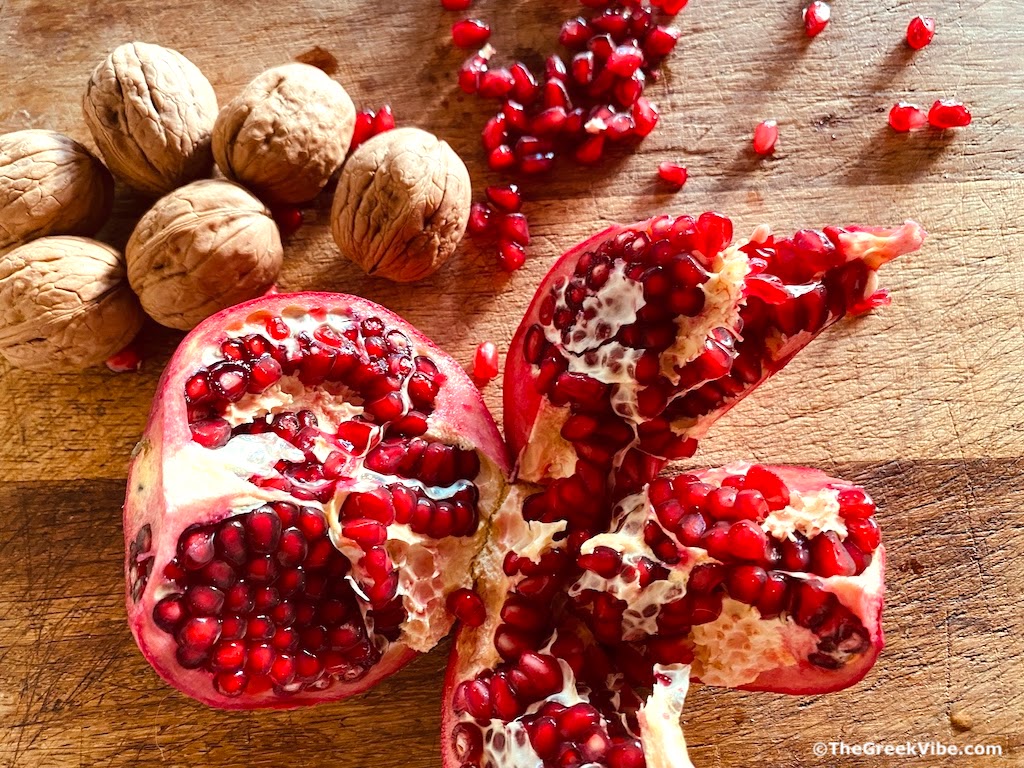
“May your new year be full of abundance in all aspects of life” – that in short is the message of a smashed pomegranate on the first day of the year for the Greeks.
So why are Greeks eager to shatter a pomegranate for the new year upon entering their homes (with the right foot) on January 1? I remember one aunt telling me when I was a little girl visiting the Peloponnese, that the pomegranate or “rodi” in Greek, had as many seeds as the days of the year and one wish for each! So you can imagine. Who wouldn’t want to have at least 365 wishes for good health, wealth, and happiness on the first day of the year? I sure did.
The Pomegranate in Greek Culture

The pomegranate has been a very important part of Greek culture and religion since ancient times, when it first made its way via Arab and Phoenician tradesmen to our shores from Persia or modern-day Iran – Northern India, where it is the national fruit. For evidence, you’ll find mention of the pomegranate in Homer’s works and in 3rd-century AD “Deipnosophistae” by Athenaeus, who said that Aphrodite, the goddess of love, herself had planted the first pomegranate tree on Cyprus.
The actual word “rodi” derives from the Greek verb “reo” which means “to flow” and that’s exactly what it symbolizes among others: the flow of all good things in life.
For the Greek Orthodox Church, the pomegranate symbolizes the unity of faith (we are all equal under god) and its rich red seeds the belief in miracles and divine grace.
In addition to the Greeks’ New Year tradition of smashing a pomegranate, they also hung a “rodi” for good luck on the doors of their homes.
Today, the usual gift Greeks offer on Christmas and New Year is a “gouri” or lucky charm which features, what else, a pomegranate made of glass or crystal which could be hung on the Christmas tree as an ornament or on the front door for good luck and abundance. Greeks also offer a pomegranate charm as a gift for the opening of a new shop or business as well as to newly purchased homes.
By the way, for the Greeks, seeing a pomegranate in your dreams is also a sign of good fortune!
The Greeks’ New Year’s Day Pomegranate Custom
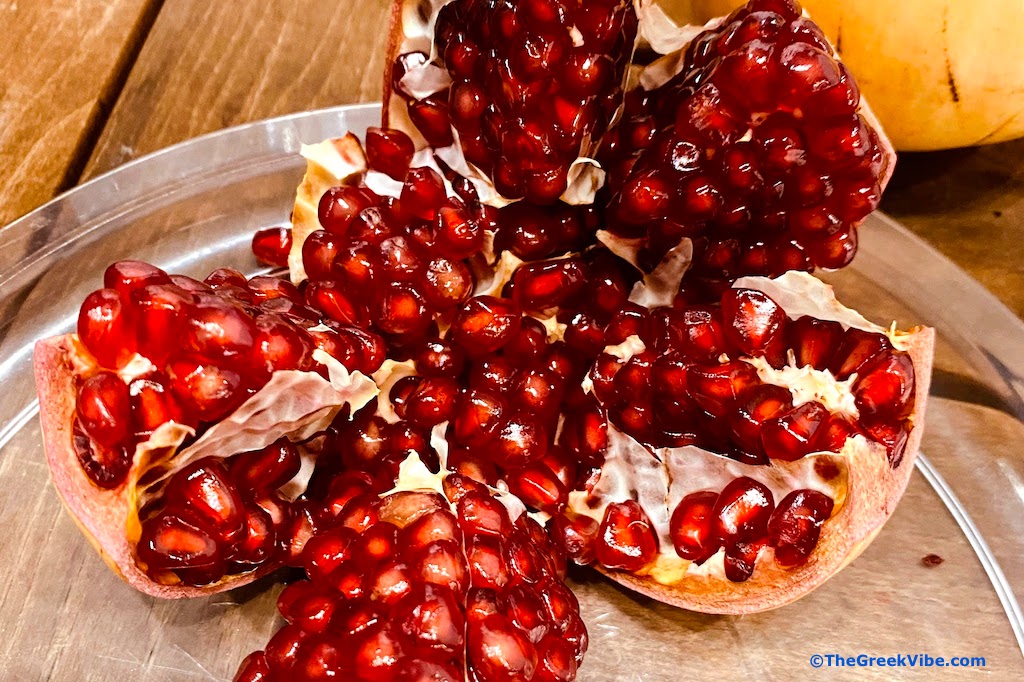
On New Year’s Day, after church (for those who still go), the head of the family, in the past the father, would smash a “rodi” hard on the ground upon entering the home. In Greek, we call this “kalo podariko”, which means to enter the home on the right (literally) foot and bring the best wishes for a New Year of abundance and joy.
The pomegranate kernels must spread across the floor with a wish of abundance and prosperity. The more seeds scattered, the better the luck. Yes, I know this sounds a bit messy, but it’s only for a day.
Pomegranates are also used as Christmas and New Year’s decorations. And in the past, I remember my grandmother always having a pomegranate in the “iconostasi”, a small shrine-like corner of the home where all the icons were held.
►10 Perfect Greece-inspired Holiday Gift Ideas
The Pomegranate and Greek Weddings
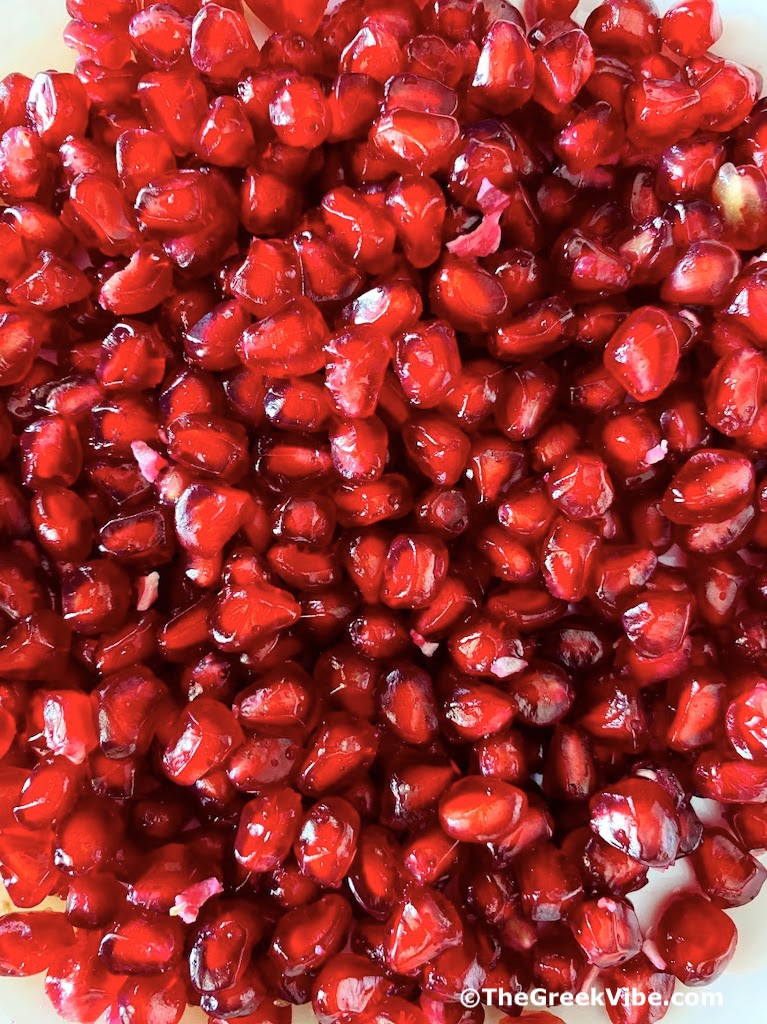
However, the importance of the “rodi” for the Greeks does not stop with Christmas and New Year’s. The fruit is a very important part of Greek wedding customs as well as death rituals. I know, it sounds strange, but yes, these two do go hand in hand in this life whether we like it or not.
Much like on New Year’s Day, the newly-wed couple is expected to smash a pomegranate after the church ceremony and upon entering their new home. In this case, the kernels spread out on the floor represent, first and foremost, fertility and happiness. Many children were a sign from god and very much needed in the past. It is also the symbol of good luck, prosperity and abundance.
Before the wedding ceremony, Greeks use pomegranates during the “Nyfiki pastada”, a wedding bedroom ritual when the couple’s bed is prepared with the best linens of the house specially made for this occasion by the female members of the household. One of the items included is the pomegranate as a wish for fertility and a happy marriage. Let’s not forget, the pomegranate was a sacred offering to both Aphrodite, the goddess of love, and Hera, the goddess of marriage, family and childbirth.
How has the pomegranate come to signify fertility? Greek myth of course. There is always a Greek myth (or story) behind everything in life. Let’s not forget, the Ancient Greeks were among the world’s first storytellers. (Sorry influencers, yes, there were others before you.)
The Pomegranate in Greek Myth
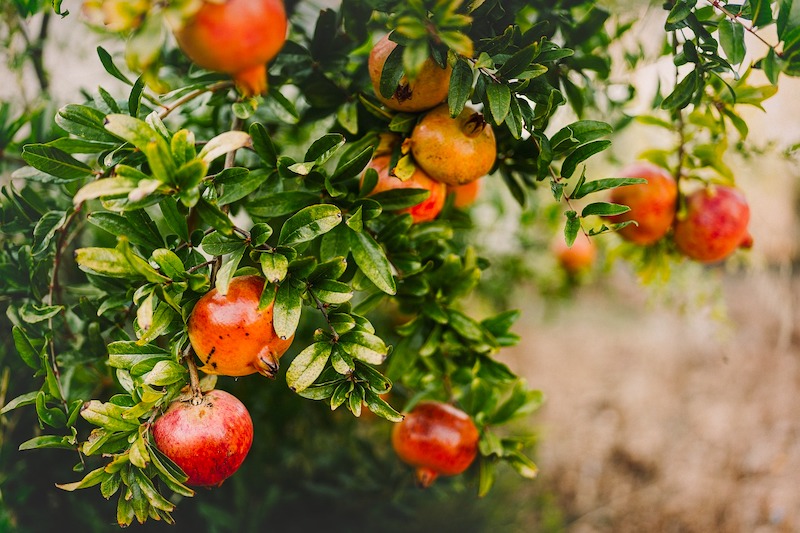
Greek myth has it that entranced by her beauty and innocence, Hades (aka Pluto), the Greek God of the Underworld, decided on whim to abduct Persephone from her mother, Demetra, who is basically as close as you can get to Mother Earth.
Hades had no intention of letting Persephone return to her mother which angered Demetra so much that she let the earth go barren and the people starve.
So Zeus, the king of the gods and a sibling of both Demetra and Hades, had to do something fast otherwise he would have no realm to rule over so he made a deal with Hades to allow Persephone visit her mother. And so Hades, also the brother of Zeus and Poseidon, had to make sure she would return. And this is where the bright red “rodi” or pomegranate comes into the tale.
Hades gave Persephone six pomegranate seeds to eat which meant that they were “officially” wed and bound for life an so she would have to return to his arms. Under the deal, six seeds or six months she would spend on earth with her mother. These are the months of spring and summer when the land is fertile. And six more months she would spend in the underworld, during fall and winter when the land rests.
►What Do Greeks Do on New Year’s
If you visit the Archaeological Museum in Athens or the Parthenon you will see the pomegranate everywhere in Ancient Greek art. For one, Hera, the goddess of marriage and fertility is usually portrayed holding a pomegranate, and the Kores, ancient Greek marble sculptures of maidens, also usually hold a pomegranate in their hands.
Have in mind that the pomegranate tree was once a woman named Side, who was also the wife of warrior Orion (whom we can still see in the night sky). Of course, according to Greek myth, Side brought this predicament upon herself when she dared say that she was fairer and more beautiful the Hera. When the goddess found out she turned Side into the pomegranate tree we know today.
The Pomegranate and Death in Greek Myth
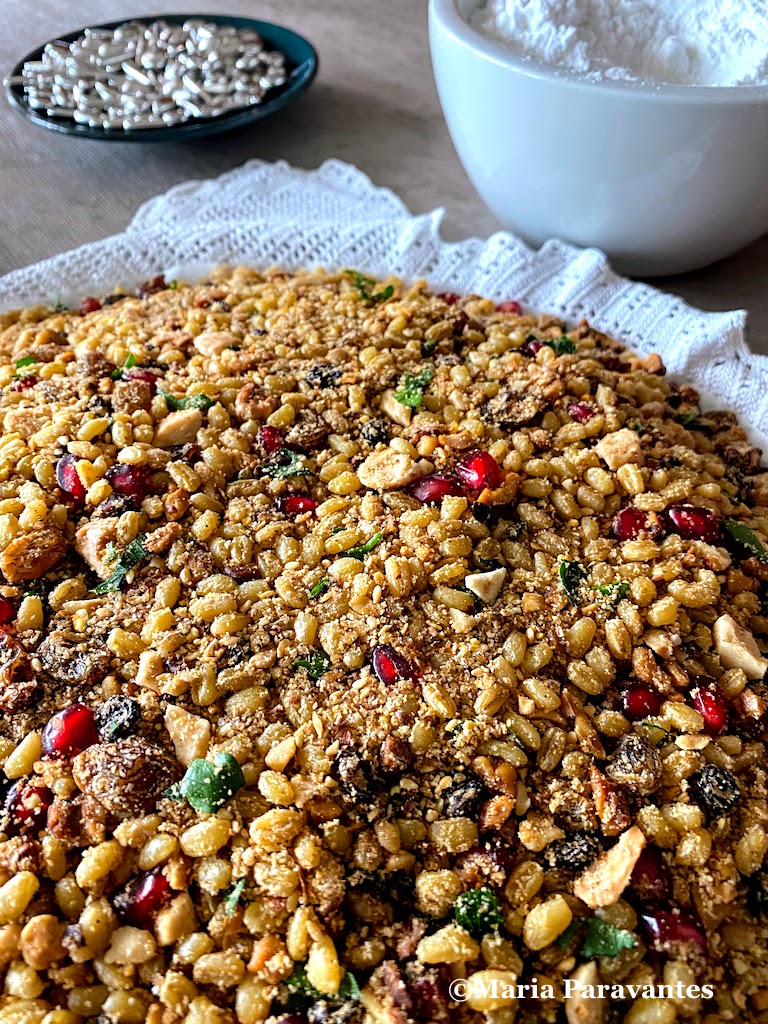
So for six months Persephone would return to the realm of the dead and her mother Demeter would put the earth to sleep leaving the land bare and unfruitful – a temporary death of sorts.
However, in the cycle of life, death and life, hope and acceptance coexist. And this is exactly why the pomegranate is associated with Greek death rituals. You will find pomegranate kernels in koliva, an offering made in memory of those who have passed.
The practice of making koliva goes back to Ancient Greece and to the “panspermia”, which was made with kernels of wheat, nuts and pomegranate. The “panspermia” was prepared to celebrate major life events such as marriage or harvest and also offered in memory of departed souls. It was also offered during fertility festivals in honor of the cycle of life, death and rebirth.
In this way, it also symbolized brilliance and wealth in the afterlife and that is why you will find pomegranate seeds in koliva.
► Read more about the symbolism of koliva ingredients
How do Greeks Use Pomegranates

The pomegranate is ripe and ready for use in the fall. In the past, our grandparents would simply break it open and indulge in the kernels. It was a common sight to see young boys their faces all red after eating a “rodi” they found along the way home from school. You understand that it was not “respectable” for girls to do this back then. Today, however, the pomegranate seeds feature in contemporary Greek cuisine and very much so in festive salads and marinades, accompanying roasted meats, and in flashy desserts. I decorate my New Year’s vassilopita cake with pomegranate kernels.
►Greek Carols for the New Year – The Kalanta Tradition
How to Choose a Pomegranate
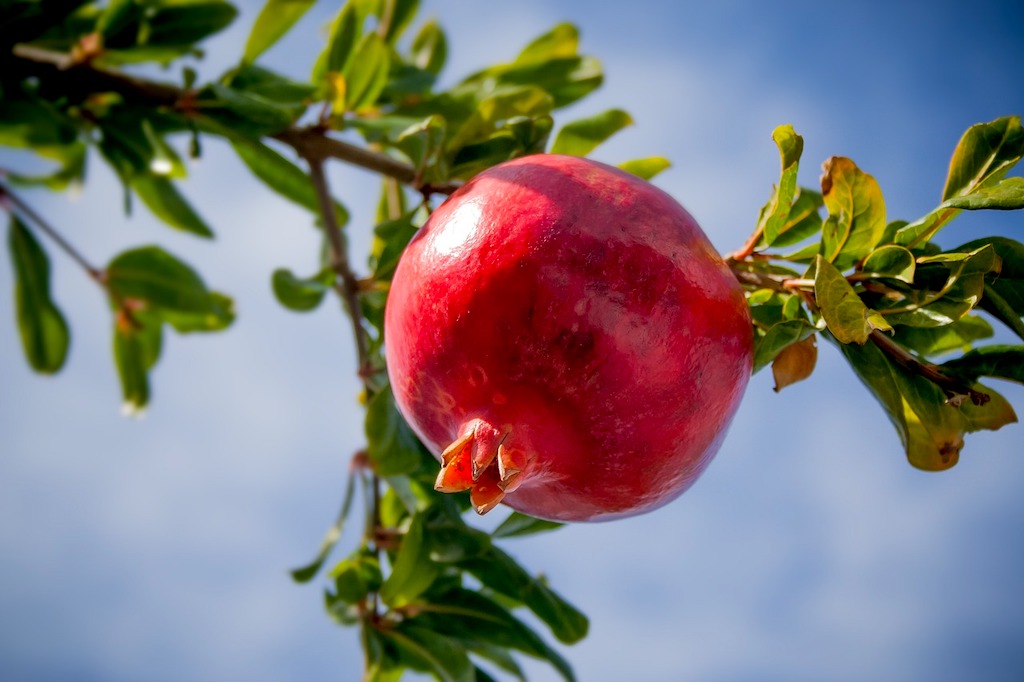
Like I said above, pomegranates are ready for picking in October and through to December. Since most of you won’t be near an orchard to simply pick it off the tree, you will definitely find them at the supermarket or better yet at the weekly “laiki” or farmers’ markets.
Make sure the pomegranate is large and heavy. It should also be hard on the outside and look healthy without bruises or cracks. Some are smooth and shiny but you can also find the rough-skinned varieties which are the ones I prefer. As for the color, the “rodi” ‘comes’ in a range of reds depending on the variety. The taste should be sweet and tart and the kernels crispy.
The Pomegranate: A Health Booster
In addition to their sweet and tart taste, pomegranates are very nutritious packed with vitamins, rich in antioxidants and with anti-inflammatory, anti-bacterial and anti-viral properties.
This means that pomegranates have been found to be good for the heart, help reduce inflammation, help memory and cognitive functions, alleviate symptoms of joint pain and stiffness, and are a great source of dietary fiber. Plus they boost the immune system and promote collagen production. That’s why many skincare products use pomegranate extracts.
At the same time, pomegranate juice is said to be elixir of youth thanks to its anti-aging effects – or so they say. It is also believed by many that the forbidden fruit, the notorious apple in the Garden of Eden, was actually a pomegranate.
►Epiphany: When Greece Blesses the Waters to Mark a New Start
The Pomegranate in Greek Sayings
Last but not least, these are some of the wishes Greeks make when they smash the pomegranate (“rodi” )on New Year’s Day.
“With wishes of health, happiness and joy for the New Year and may you have as many pounds (lire) in your pocket all year round as kernels”.
“May your home be as abundant as a pomegranate”
“May your wallet be as heavy as the pomegranate, your home as rich as its kernels, and your heart as red.”
♫ I end today’s post with one of my favorite traditional (demotika) songs from Eastern Macedonia about the pomegranate: “Milo Mou Kokkino” featuring Katerina Papadopoulou and Christos Tsiamoulis.
Enjoy!
Enjoyed this Post? Share and Pin it!
